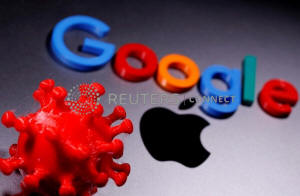U.S. senator says Apple, Google need to show contact tracing will not
violate privacy
 Send a link to a friend
Send a link to a friend
 [April 16, 2020]
WASHINGTON (Reuters) - Smartphone
software makers Alphabet's Google and Apple will have to convince the
public that any contact tracing technology to track who has been exposed
to the new coronavirus will not lead to a violation of their privacy,
Senator Richard Blumenthal said on Wednesday. [April 16, 2020]
WASHINGTON (Reuters) - Smartphone
software makers Alphabet's Google and Apple will have to convince the
public that any contact tracing technology to track who has been exposed
to the new coronavirus will not lead to a violation of their privacy,
Senator Richard Blumenthal said on Wednesday.
"Apple and Google have a lot of work to do to convince a rightfully
skeptical public that they are fully serious about the privacy and
security of their contact tracing efforts," he said in a statement.
A critical factor in re-opening economies shuttered by the coronavirus
pandemic is the ability to identify who has come into contact with
carriers so that public health officials can control a resurgence of the
COVID-19 disease caused by the virus.
This contact tracing effort got a boost recently when Google and Apple
said they were collaborating on technology to help identify people who
have crossed paths with a contagious person and alert them.

"I urgently want to know how Apple and Google will assure that
consumersí privacy interests are strongly balanced with the legitimate
needs of public health officials during the coronavirus pandemic," said
Blumenthal, who has been outspoken about privacy issues raised by the
powerful tech companies.
"A public health crisis cannot be a pretense to pave over our privacy
laws or legitimize tech companies' intrusive data collection about
Americanís personal lives," he said.
Apple and Google had no comment on Blumenthal's remarks but pointed to a
joint release which said that "privacy, transparency, and consent are of
utmost importance."
The companies said they started developing the technology in March to
streamline technical differences between Apple's iPhones and Google's
Android that had stymied the interoperation of some existing contact
tracing apps.
[to top of second column]
|

3D printed coronavirus model and Google logo are placed near an
Apple Macbook Pro in this illustration taken April 12, 2020.
REUTERS/Dado Ruvic/Illustration/File Photo

The companies said that the technology - planned to be released in
mid-May - would not track users' locations but their interactions,
that the interactions would be anonymized and that nothing would be
monetized.
Dr. Anthony Fauci, infectious disease chief at the National
Institutes of Health, told Snapchat's "Good Luck America" that he
had not spoken with Google or Apple but believed that the public
would accept contact tracing apps more easily if they were not run
by the federal government.
"I think they'd feel better about it if it's private," he said.
Apple and Google have taken many positive steps to protect privacy,
said Sara Collins, policy counsel at the advocacy group Public
Knowledge.
"While this is a promising first step, there are other controls that
will need to be put in place to make this truly privacy protective,"
she said, including limits on sharing data and deleting data once it
is no longer needed.
(Reporting by Diane Bartz; editing by Jonathan Oatis and Sonya
Hepinstall)
[© 2020 Thomson Reuters. All rights
reserved.] Copyright 2020 Reuters. All rights reserved. This material may not be published,
broadcast, rewritten or redistributed.
Thompson Reuters is solely responsible for this content.
 |